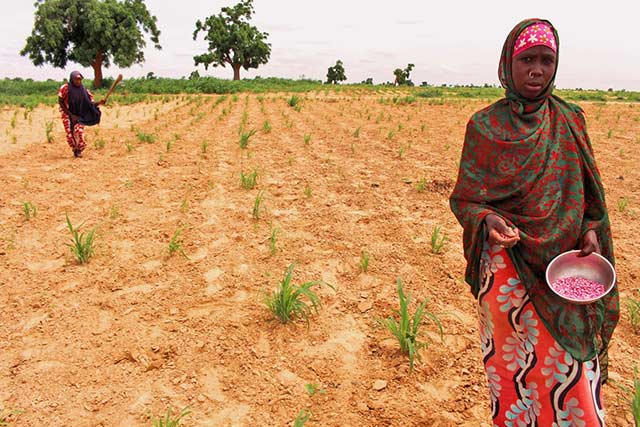HOMEF, CSOs, Farmer Group Leaders Recommend Solution to Food, Climate Crisis in Nigeria

Health of Mother Earth Foundation (HOMEF) among other Civil Society Organisations and 15 farmer group leaders/trainers from across the country have offered recommendations geared towards solving the food and climate crisis experienced in Nigeria.
The recommendations are contained in a communique issued at the end of a practical training organized by Health of Mother Earth Foundation in collaboration with the GMO-Free Nigeria Alliance and Be the Help Foundation for CSOs and Trainers at the Agroforestry Farm in Kwali Area Council, Abuja on 17-18 May 2024.
The training which focused on the implication of Genetically Modified Organisms (GMOs) and inorganic pesticides; practical production of organic pesticides and fertilisers; agroforestry including water, carbon and nutrient cycles, plant and soil health and reproduction; biodiversity improvement; and farm management observed that key implications with the use of GMOs include contamination of local varieties; the need to continuously purchase seeds due to patent rights; lack of accountability, loss of biodiversity, soil degradation resulting from excessive use of herbicides; and health complications linked to consumption of GMOs.
To address the concern, the participants called on the government, at federal, state and local government levels to do more in monitoring seeds and chemicals that farmers are given.
They noted that the decision by the House of Representatives to probe the approval of GMOs in Nigeria is laudable but the government must ensure that the investigations are fair and thorough.
The participants asked that there should also be a proper examination on the root causes of food insecurity in Nigeria and direct measures to address them.
They said the government should provide farmers better access to land and better land tenure systems to encourage the adoption of agroecology – a sustain-able agricultural practice.
It was agreed that governments at all levels should increase support for farmers with provision of needed infrastructure and good roads to access markets as well as extension service.
They called on the government to endorse and adopt agroecology as the sustain-able farming system in Nigeria which will not only ensure food security, but also bring about food sovereignty while improving adaptation to climate change.
Part of the communique added “The CSOs also recommended that the government through the Ministry of Agriculture and Rural Development, should partner with groups like HOMEF and the BHF to set up agroecology demonstration farms in communities and extend the knowledge/practice of agroecology to more farmers/communities across the country.
” In setting up an agroecology farm, it is important to engage the community where it is situated and ensure they are at the center of the project; endeavor to add employment from within the community and carry them along in the process to mitigate and eradicate any crisis.
“The Nigerian public should critically examine and reject common narratives imposed on us, including on the non-viability of local seed varieties; population escalation and the need to adopt modern agricultural biotechnology etc”.
Earlier, the gathering had observed that the industrialization of agriculture which was acclaimed to bring farmers out of poverty has overtime, hindered the productivity of the farmers and disrupted ecosystem balance and nature’s cycles.
They noted that Nigeria’s outlook on modern agricultural biotechnology as solution to current food system challenges/food insecurity is erroneous as this technology doesn’t align with our food system and does not address fundamental agriculture related issues such as insecurity, poor access to land/credit, lack of proper infrastructure for processing and storage, poor extension service, poverty among others.
The participants pointed out that Agroecology cuts down cost for the farmer, increases yield, and reduces crop loss, and soil death, while providing for the well-being of the farmer.
They said Agroecology ensures pests and weeds are effectively managed using natural practices that help rejuvenate biodiversity and sustain life in the ecosystem.
They explained that Agroecology is a model of agriculture that allows for the farmer to systemically run his farm in a way that is profitable adding that with this model, autonomy and control of seeds is taken away from the hands of the corporations and handed back to the farmer.
Part of the communique added “There is an existing knowledge gap as not many farmers are aware of agroecology and its benefits. For this system to work effectively, farmers must be trained and equipped with the knowledge of the models to bridge the gap.
” On how a smallholder farmer can practice this model, considering the accessibility of land, it was noted that this system of agriculture is designed specifically for the small holder farmer. It involves crop rotation and multi-cropping, so the farmer needs to have the knowledge of the kinds of crops, trees, how they grow, when they produce, so round the year, something is being harvested from the farm.
” This will help in the designing of the farm – the spacing you would make from one alley point to another, the canopy size of the tree, what kind of crop can grow without much shade under a tree’s canopy amongst others, so there is symbiotic growth in the system. This will help manage effectively the land available to the farmer.”
On how to get funding to set up an agroecology farm, it was suggested that communities or groups of people can initially start up the farm as a collective, develop and build knowledge and then it will be feasible for individuals to reproduce the system.







